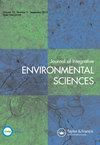廷希尔和丹吉尔(摩洛哥)地区应对环境变化的迁移-适应关系的定性研究
IF 3.5
4区 环境科学与生态学
Q3 ENVIRONMENTAL SCIENCES
Journal of Integrative Environmental Sciences
Pub Date : 2021-01-01
DOI:10.1080/1943815X.2020.1869784
引用次数: 2
摘要
在过去的二十年中,迁移作为适应的论述已经理论化并研究了迁移如何促进适应以应对不利环境变化的影响。然而,诸如移徙趋势、当地社会和经济情况等环境因素以及对这种联系的认识往往被忽视。本研究旨在了解人们如何看待这种关系,以及移民(通常以汇款的形式)是否以及如何用于适应目的。在这项研究中,对丹吉尔和廷希尔(摩洛哥)的居民进行了48次半结构化访谈。这些地区面临着不同的环境变化影响。虽然两者都面临着降水增加和温度变化,但廷希尔还面临着干旱、荒漠化、水资源短缺和越来越多的极端天气事件。此外,这两个地区都接受国内移民,并有大量移民前往欧洲。结果表明,移民和汇款可以产生多种适应环境变化的结果,导致现有社会脆弱性的加剧,改变社区层面的经济发展,并影响个人/家庭和社区层面的替代适应战略的制定。研究结果表明,必须在社会、政治、经济和环境背景下考虑移民作为适应的话语。这些论述应该考虑当地的移民历史和流行的移民文化。本文章由计算机程序翻译,如有差异,请以英文原文为准。
A qualitative study of the migration-adaptation nexus to deal with environmental change in Tinghir and Tangier (Morocco)
ABSTRACT Over the last two decades, migration-as-adaptation discourses have theorized and studied how migration could facilitate adaptation to deal with the effects of adverse environmental change. However, contextual factors, such as migration trends and local social and economic contexts, as well as perceptions of this linkage have often been neglected. This study aims to understand how people perceive this relationship and whether and how migration, often in the form of remittances, is used for adaptation purposes. For this study, 48 semi-structured interviews were conducted with inhabitants of Tangier and Tinghir (Morocco). These regions are confronted differently by environmental change impacts. While both face increasing precipitation and temperature changes, Tinghir is additionally confronted with drought, desertification, water scarcity, and a growing number of more extreme weather events. Furthermore, both regions receive internal migrants and experienced significant emigration towards Europe. Results indicate that migration, as well as the sending of remittances, could produce a multitude of adaptation outcomes towards environmental change, resulting in an exacerbation of existing social vulnerabilities, alter economic development at the community level, and impact the development of alternative adaptation strategies, at both the individual/household and community levels. Findings demonstrate that migration-as-adaptation discourses must be considered within social, political, economic, and environmental contexts. These discourses should consider local migration histories and prevalent cultures of migration.
求助全文
通过发布文献求助,成功后即可免费获取论文全文。
去求助
来源期刊

Journal of Integrative Environmental Sciences
ENVIRONMENTAL SCIENCES-
CiteScore
3.90
自引率
0.00%
发文量
13
审稿时长
>12 weeks
期刊介绍:
Journal of Integrative Environmental Sciences (JIES) provides a stimulating, informative and critical forum for intellectual debate on significant environmental issues. It brings together perspectives from a wide range of disciplines and methodologies in both the social and natural sciences in an effort to develop integrative knowledge about the processes responsible for environmental change. The Journal is especially concerned with the relationships between science, society and policy and one of its key aims is to advance understanding of the theory and practice of sustainable development.
 求助内容:
求助内容: 应助结果提醒方式:
应助结果提醒方式:


